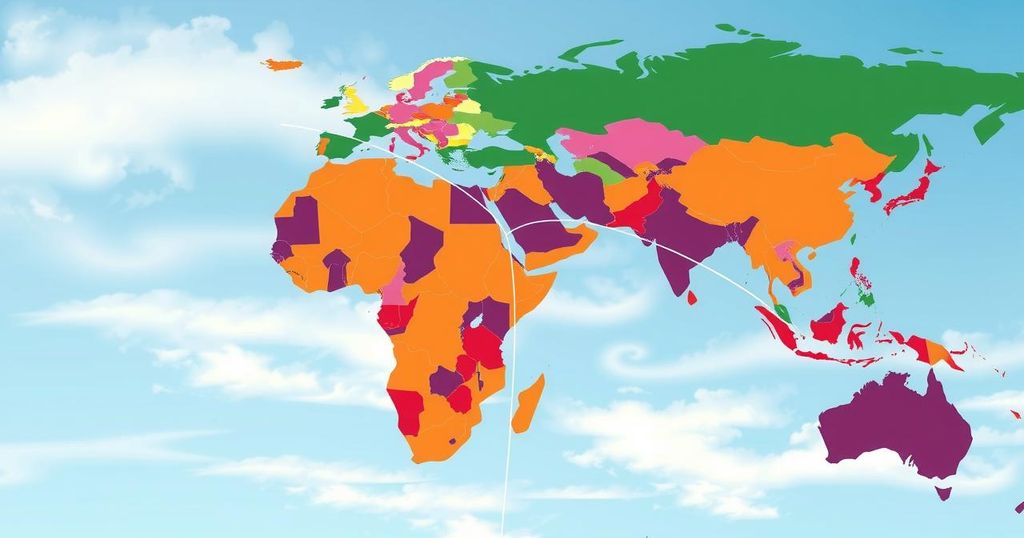Sudan has filed an ICJ case against the UAE for complicity in genocide related to its support of the RSF, which has committed widespread atrocities against the Masalit community. The situation mirrors earlier conflicts in Darfur and poses significant challenges for international justice. Support from the Global South is crucial for upholding the integrity of international law. Ignoring Sudan’s plight risks reinforcing existing power asymmetries in international relations.
The International Court of Justice (ICJ) has been alerted as Sudan filed proceedings against the United Arab Emirates (UAE), charging it with complicity in genocide through its support of the Rapid Support Forces (RSF). The RSF has engaged in violent power struggles against the Sudanese Armed Forces (SAF) since April 2023. Sudan’s claims highlight RSF atrocities against the Masalit ethnic group, leading to the massacre of up to 15,000 civilians and displacing half a million into Chad, reminiscent of the earlier Darfur conflict.
Sudan alleges that the UAE has breached the Genocide Convention by facilitating RSF’s genocidal actions. Forensic evidence, including reports from the Raoul Wallenberg Centre and Human Rights Watch, detail systematic violence, including killings and sexual assault. Satellite imagery corroborates widespread destruction of civilian areas, while UN reports reveal mass graves discovered following RSF attacks, underscoring the ethnic targeting of the Masalit population.
The substantial evidence against the UAE includes its documented arms supply to RSF fighters, with credible reports of weapon transfers via the Amdjarass base in Chad. Flight data confirm numerous arms-related flights to this area, alongside the revelation of a secret Emirati drone base, utilized for RSF operations, exposing civilians to increased fatality rates during urban confrontations.
The UAE’s influential global standing complicates the situation, given its significant economic power and established relationships with Western nations. Efforts by U.S. legislators to halt arms dealings with the UAE have been undermined by its alleged continued support for the RSF, raising concerns regarding accountability in international relations.
In light of this, Sudan’s ICJ case comes during a critical time for international justice, paralleling South Africa’s recent genocide charges against Israel, which garnered support from several Global South nations. If the Global South fails to support Sudan similarly, it would jeopardize the principles of solidarity fostering international legitimacy.
It is essential to acknowledge that supporting Sudan’s case does not imply endorsement of the SAF’s actions, which have also drawn scrutiny for civilian casualties. However, backing Sudan’s pursuit of justice rests upon broader principles of accountability, especially emphasizing the dangers posed by the UAE’s unchecked power in regional conflicts.
The international justice framework stands at a pivotal moment, where a favorable ruling for Sudan could bolster respect for human rights by the ICJ. The UAE’s potential maneuvering within legal frameworks may face challenges based on established treaty law interpretations, particularly regarding reservations to the Genocide Convention that potentially obstruct accountability.
In conclusion, without support for Sudan at this juncture, the Global South risks enabling a paradigm where might supersedes justice. The silence of nations in addressing Sudan’s grievances could lead to further exploitation by more powerful states, exacerbating the suffering of civilians caught in the geopolitical landscape.
The ongoing ICJ case initiated by Sudan against the UAE underscores the pressing need for Global South nations to uphold principles of accountability in international law. Failure to support Sudan could lead to a detrimental precedent impacting future justice initiatives. Encouraging a robust legal response is essential to counteract the influence of powerful states that may undermine sovereign rights and perpetuate human rights abuses. The stakes, indeed, are significant, with potential implications for the credibility of international judicial mechanisms.
Original Source: foreignpolicy.com




